Here are the Best Ornamental Grasses for Containers that you can grow to decorate your house, garden, balcony, or patio!
Grasses are not just only for meadows, lawns, and gardens. This is why here’re some of the Best Ornamental Grasses for Containers that you can grow easily in small spaces!
Have a look at the most beautiful red ornamental grasses here
1. Bamboo Muhly
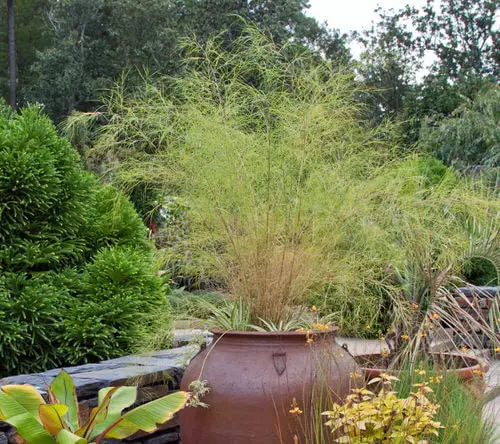
Botanical Name: Muhlenbergia dumosa
USDA Zones: 8-11
Almost fern-like but super fine in texture, bamboo muhly grass takes its name from its notched stems and feathery foliage. It thrives in the mildly cold and tropical climate, loves sun and heat, and grows well in containers.
2. Japanese Sweet Flag
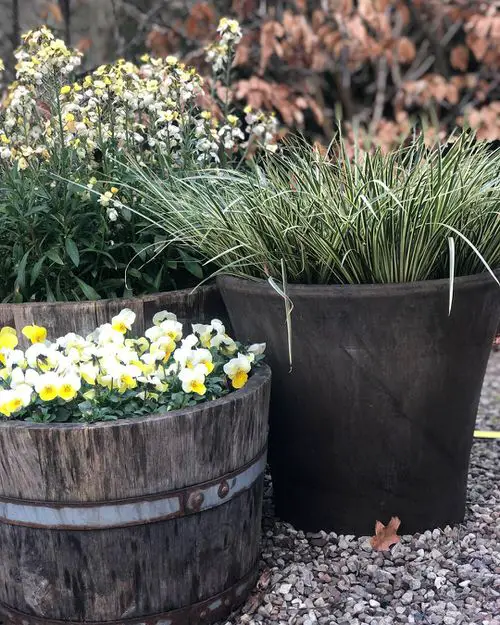
Botanical Name: Acorus gramineus
USDA Zones: 6-9
This low-growing ornamental grass is good to grow in containers if you don’t want to grow a tall variety. Japanese sweet flag is low maintenance and grows in moist and soggy soil and semi-shade to full sun.
3. Red Fountain Grass
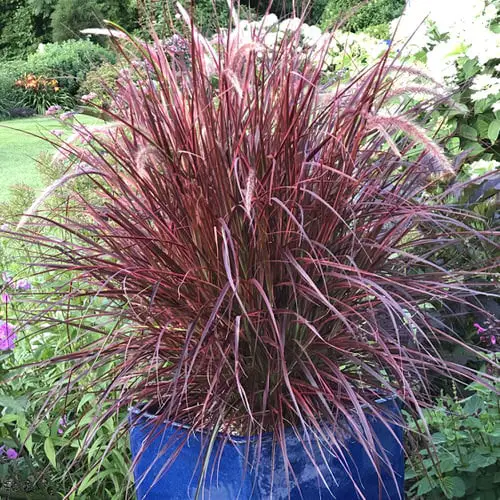
Botanical Name: Pennisetum setaceum ‘Rubrum’
USDA Zones: 9-11
Beautiful red fountain grass looks stunning with its rich burgundy colored foliage. It looks amazing with other plants in the garden!
4. Japanese Forest Grass
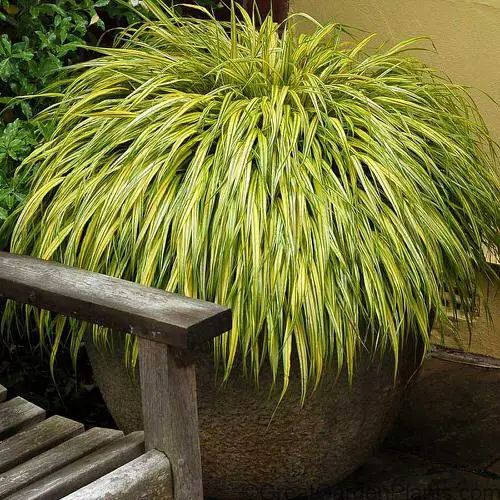
Botanical Name: Hakonechloa macra ‘Aureola’
USDA Zones: 5-9
Its foliage comes in yellow-green stripes and grows in a clump. Grow this ornamental grass in a dark ceramic pot for an absolutely stunning look.
5. Blue Lyme Grass
Botanical Name: Leymus arenarius
USDA Zones: 4-10
The sword-like foliage grows up to 3-4 feet and folds as it grows tall. This bold and spiky grass forms beige-colored flower heads, usually in summer.
6. Fiber Optic Grass

Botanical Name: Isolepis cernua
USDA Zones: 9-11
Fiber optic grass grows well in the tropics, and in a colder climate, you can grow it as annual. It hangs down gently in a curve and creates an unusual effect. It’s one of the best ornamental grasses you would like to grow in containers.
7. New Zealand Flax
Botanical Name: Phormium
USDA Zones: 9-11
New Zealand flax is perennial in frost-free areas, excellent for tropical regions. You can grow it in containers. It looks beautiful and gives a tropical feel.
8. Sedge
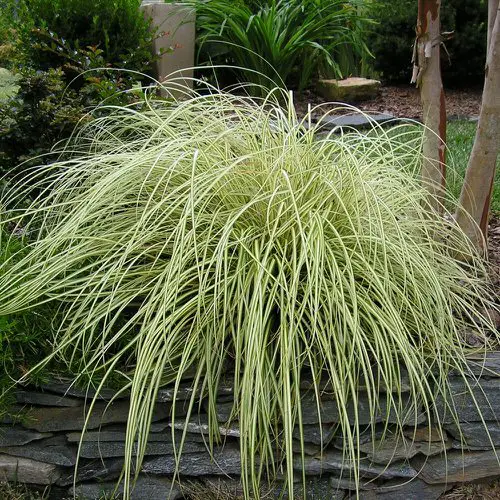
Botanical Name: Cyperaceae
USDA Zones: 8-11
The sedge looks like grass, but it is not. When grown in containers, its leaves glow in the sun and look fantastic while the blades rustle in the slightest breeze.
9. Silvergrass
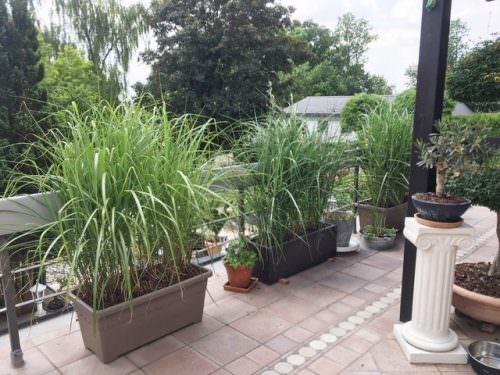
Botanical Name: Miscanthus × giganteus
USDA Zones: 6-9
One of the most popular ornamental grasses, it grows well in the container. Available in many varieties, it looks picturesque in the morning sun.
10. Blue Oat Grass
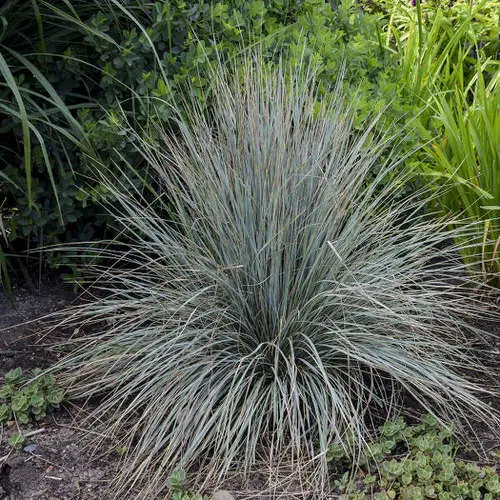
Botanical Name: Helictotrichon sempervirens
USDA Zones: 4-9
Grow this cool blue-gray grass in a pot with bright flowers to create an aesthetic look on your patio, terrace, or balcony garden. Blue oat grass is low maintenance and grows well in partial shade.
11. Feather Reed Grass
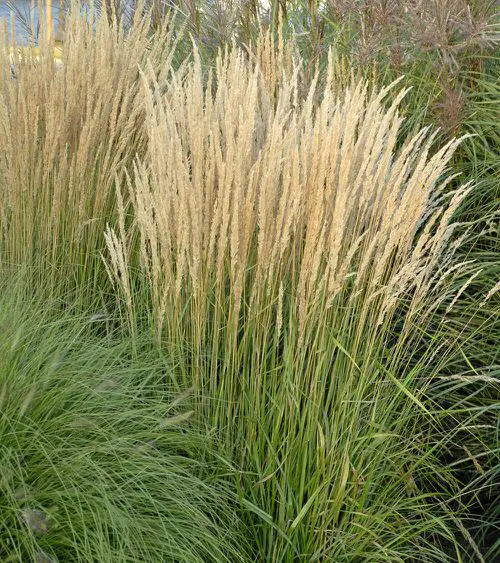
Botanical Name: Calamagrostis × acutiflora
USDA Zones: 4-9
Feather reed grass can be grown in the sun and partial shade both. It looks attractive as a focal point– on a patio if grown in a container.
12. Leatherleaf Sedge
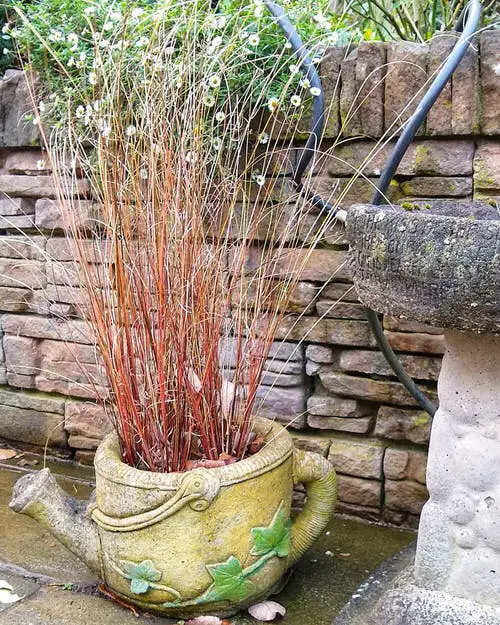
Botanical Name: Carex buchananii
USDA Zones: 6-9
The bronze-hued leaves glitter in the sun and look quite stunning! It grows up to 1-2 feet tall, with upright finely textured foliage.
13. Japanese Silver Grass
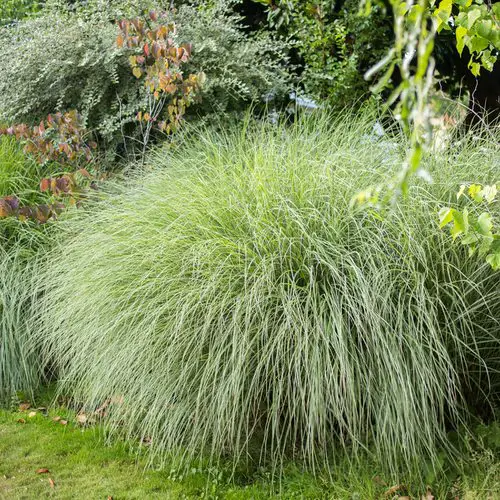
Botanical Name: Miscanthus Sinensis ‘Morning Light’
USDA Zones: 5-9
This popular grass for containers has an airy growth habit. It grows up to 3-7 feet tall with thin green upward-arching leaves with white variegated edges.
14. Japanese Blood Grass
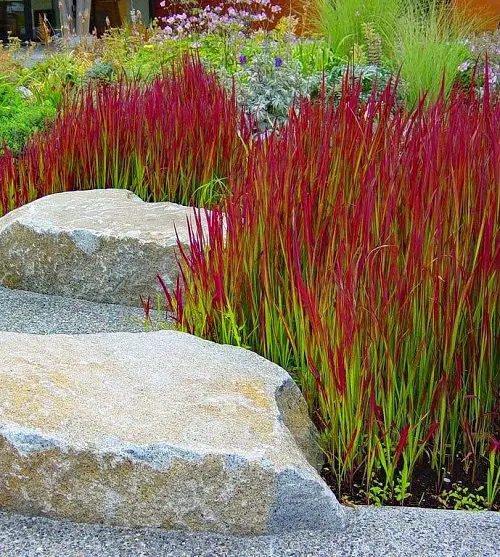
Botanical Name: Imperata cylindrica
USDA Zones: 5-9
The leaves grow in green color with red tips and mature to blood-red color. It grows up to 2-3 feet tall in clumps.
15. Ruby Grass
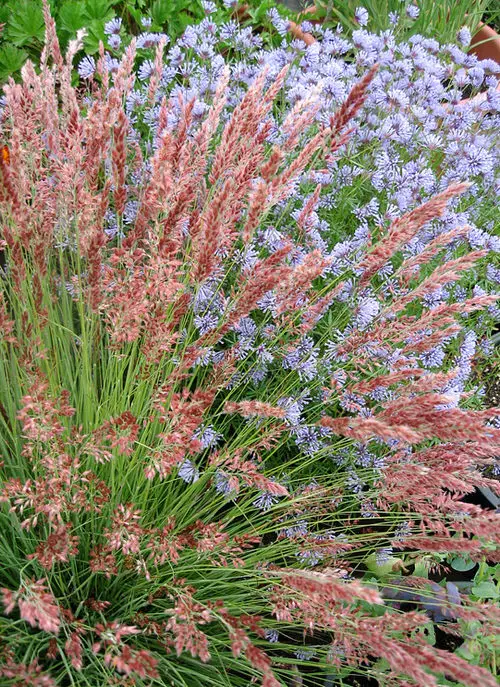
Botanical Name: Melinus nerviglumis ‘Pink Champagne’
USDA Zones: 8-10
This tropical tufting grass has a compact habit, and the narrow, blue-green leaves grow up to a foot long. It is cold-hardy and looks great as a border plant. In pots, you can mix it with other plants.
16. Black Mondo Grass
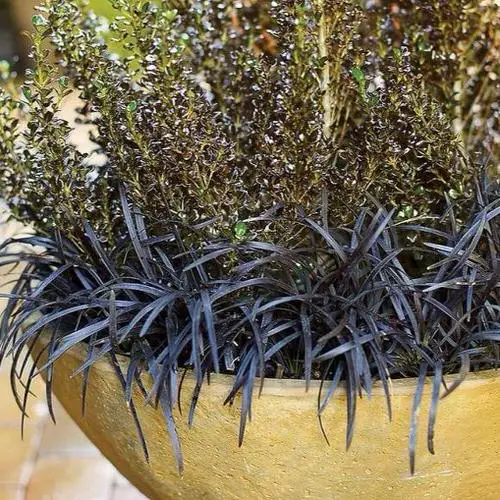
Botanical Name: Ophiopogon planiscapus
USDA Zones: 6-11
This spiky perennial has dark foliage, which almost looks black from a distance. It is easy to grow and deer resistant, so you can grow it in your garden without any worries.
17. Blue Arrows Rush
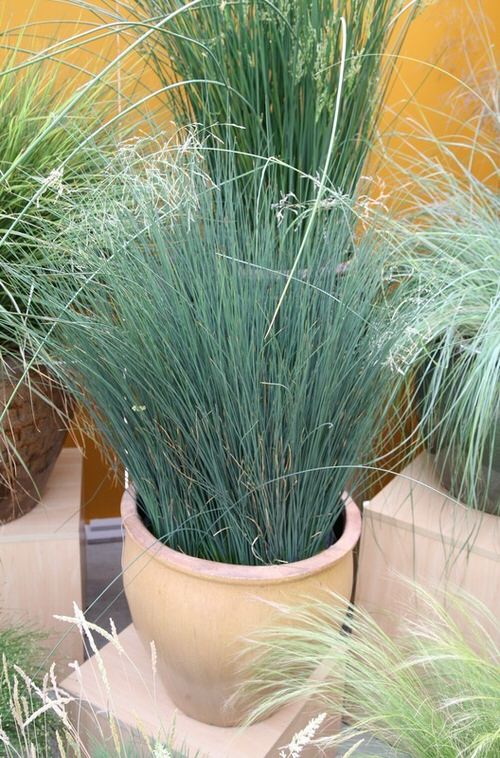
Botanical Name: Juncus inflexus ‘Blue Arrows’
USDA Zones: 4-7
This elegant wetland plant is quite heat and drought-resistant. It grows up to 3-4 feet tall with a 12-16 inches spread featuring blue-green leaves.
18. Red Rooster Carex
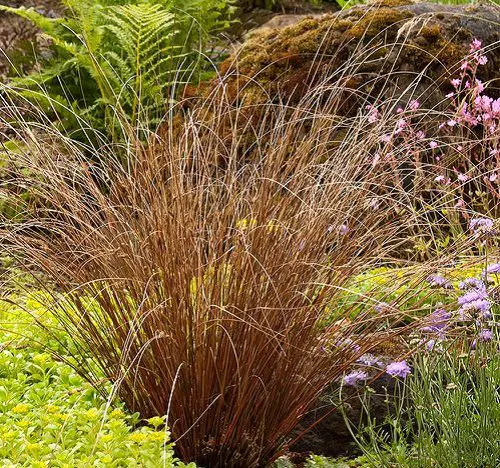
Botanical Name: Carex buchananii ‘Red Rooster’
USDA Zones: 6-9
‘Red Rooster’ can be a great addition to fall and winter containers. It does well in full sun with a good drainage facility and adds texture to mixed planting sustaining colors across the year.
19. Weeping Brown Sedge
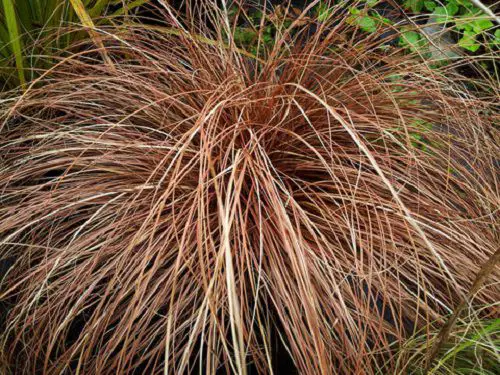
Botanical Name: Carex flagellifera ‘Bronzita’
USDA Zones: 6-9
This ornamental grass remains golden brown throughout the season. The grasslike brown leaves curl beautifully, creating attractive mounds of hairlike pearly leaves.
20. Blue Fescue
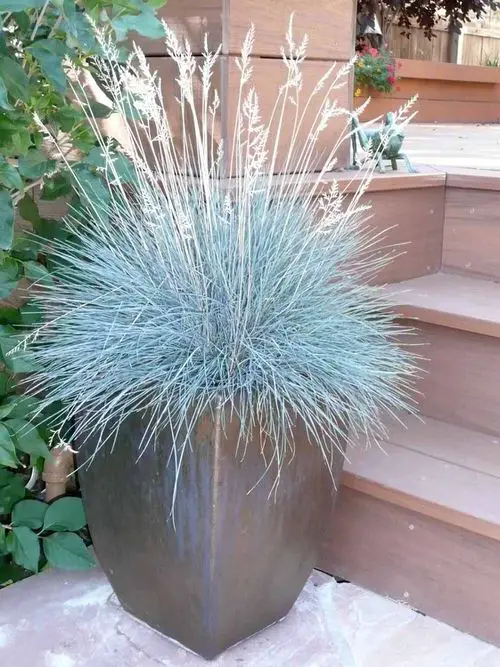
Botanical Name: Festuca glauca ‘Elijah Blue’
USDA Zones: 4-11
This dwarf ornamental grass is perfect for small to medium containers. Its bright, silver-blue foliage with blade-like needles look simply stunning.
21. Red Hook Sedge
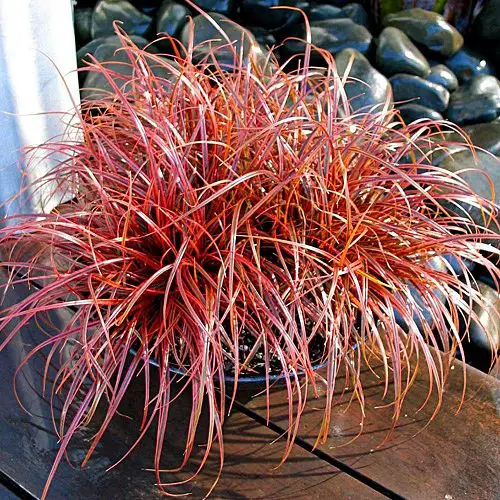
Botanical Name: Uncinia rubra ‘Everflame’
USDA Zones: 7-12
If you want colorful and glossy grass for your pots, then this is it! For the best shade of red-bronze foliage, keep it where it can get bright sunlight.
22. Ribbon Grass
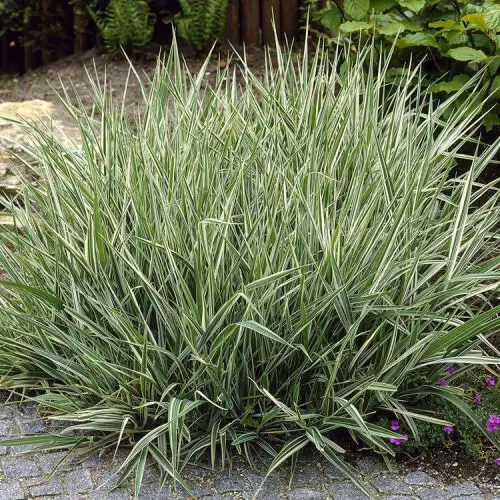
Botanical Name: Phalaris arundinacea
USDA Zones: 3-11
Also popular as reed canary grass, this grass looks charming with evergreen foliage having hints of white and yellow at the edges. It grows quite fast and doesn’t need much care.
Growing Ornamental Grasses in Pots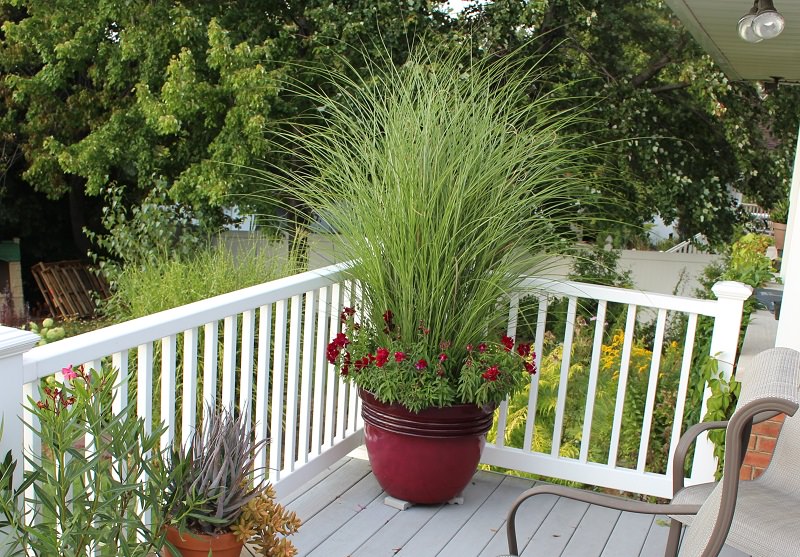
Ornamental grasses are an excellent way to create privacy in the garden, especially on a patio, balcony, or rooftop.
1. Growing Position
Ornamental grasses thrive in a spot that gets at least five to six hours of sunlight daily.
2. Choosing a Right Pot
Choosing the right pot is also necessary for growing ornamental grasses in containers. Ensure proper drainage and see if it is wide enough to let the grass spread deep enough to support the root system. You should also care about the appearance of a container.
Requirements for Growing Ornamental Grasses
Soil
The best thing about grasses is they can tolerate poor soil as well as rich soil. You can grow these in your regular potting soil or make a mix of one part compost, one part soil, and one part perlite or coarse sand for making an excellent growing medium for grass.
Watering
A general rule is to water your plants only when the top two-inch of the soil is dry. However, different grass varieties have different needs, and some even like to sit in water, so make sure to do proper research about the grass variety you’re growing.


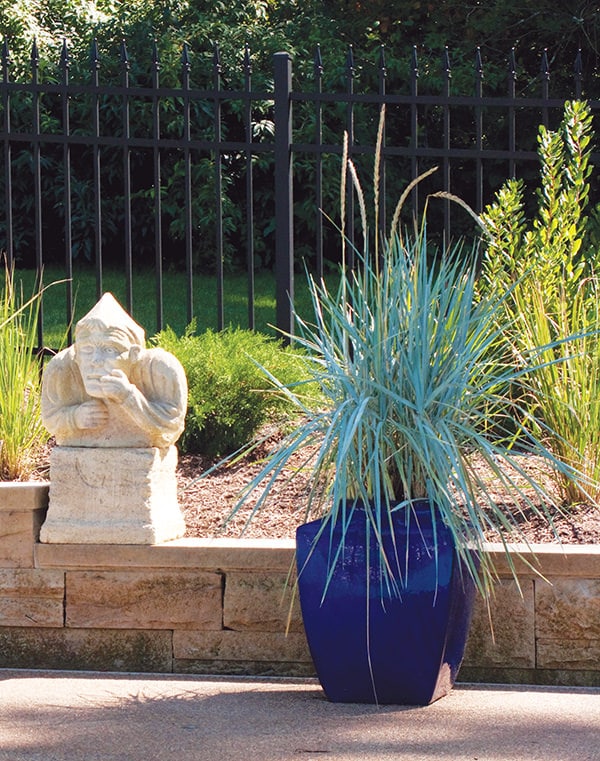


Japanese Forest Grass most plants that I love
Thank you for the information…..
What is the name of the best grass please which is the one in the picture at the top; in the red pot. Thanks.
It is miscanthus, also pictured in number 9.
which ornamental grass is best planted with succulents?
It would have been helpful if you would have mentioned the botanical names, but informative article. Thank you.
Are any of these grasses poisonous or toxic to cats or other animals? Can they be grown in a very small container in the house near a sunny west window? I’m thinking they’d be chewed on here if they’re outside on the porch at ground level where pets can reach it.
One of the best annual grasses, I’ve found, is Lemon Grass! Gorgeous! Smells good. Keeps the mosquitos away!
I agree. I love lemon grass. It also helps to keep down the fly infestation. My cats love it also. I love being able to cut a few stems to cook with baked chicken.
What do you do with them during the winter?
Saw your comment. I believe the article mentions cutting back completely.
Fran
Yes heard that.
You need to include the botanical name for the grasses.
If you look they did include them below
Caring for ornamental grasses in containers is basically the same as any other outdoor potted plant. They need regular water, but most are not as thirsty as flowering plants. Feed the plants with a high nitrogen fertilizer a couple of times during the summer, and you will need to cut them back each early spring and late winter. Other than that, the major maintenance is dividing them when they outgrow their containers, which can happen quite quickly. Left undivided, ornamental grasses can even split their pots.
Would it be possible for someone to tell which kind of grasses would be suitable for an out door vertical wall. I look forward to hearing from someone soon. Thank you
WHIch tall grass would grow best in a container on a mostly shaded porch? Late afternoon Sun 3- 5 hrs a day, Zone 7b?
Thanks for your advise.